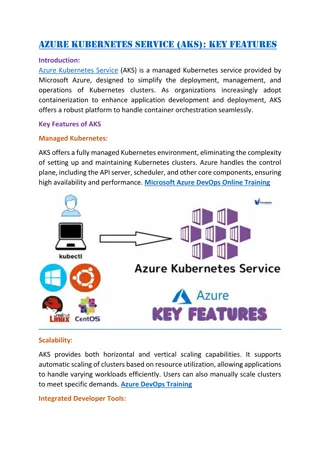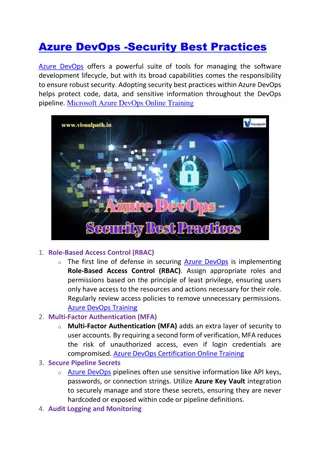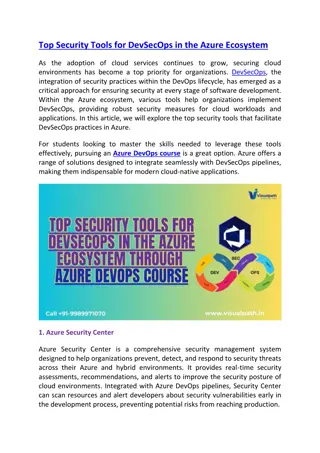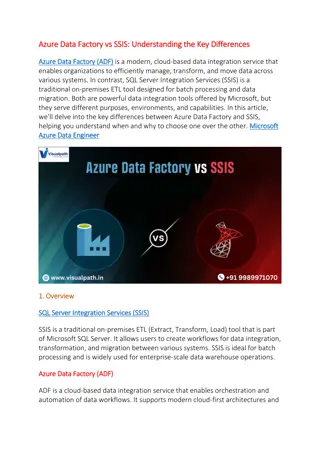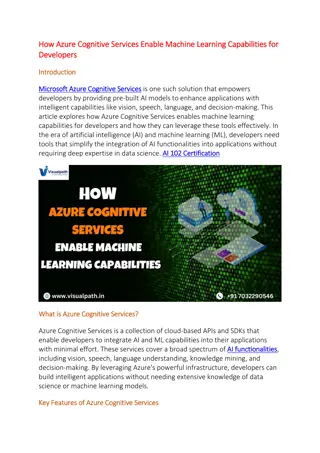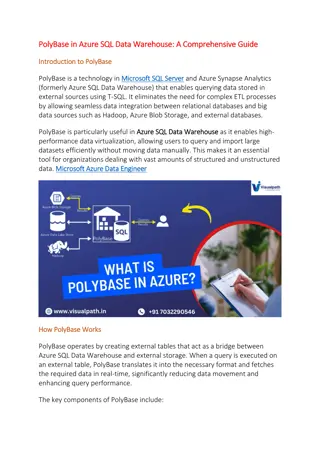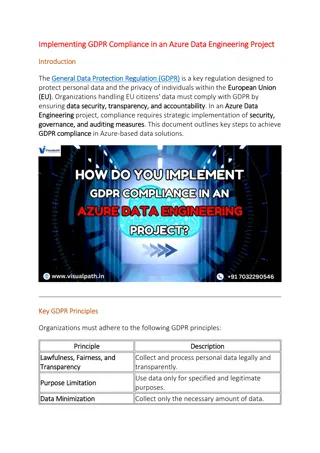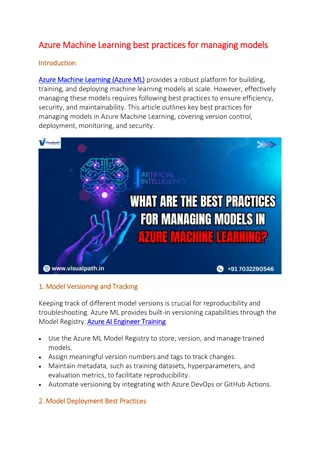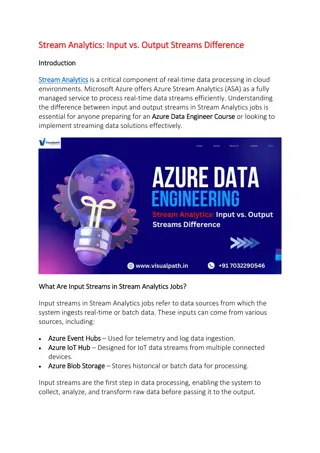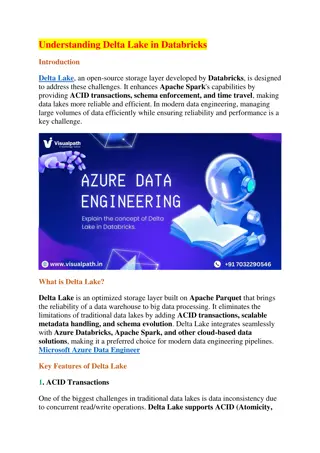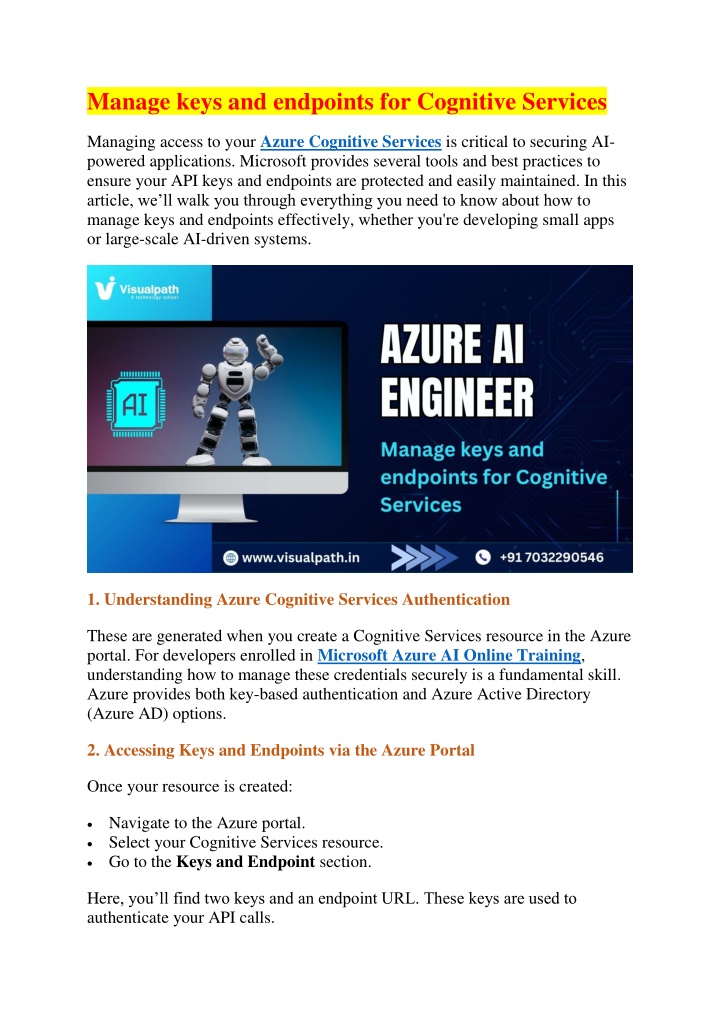
Best Azure AI Course in Hyderabad | Azure AI Engineer
Start your journey with VisualPathu2019s Azure AI Course in Hyderabad and gain practical skills through real-time projects and expert-led training. Enjoy weekend batches, global access, and lifetime access to session recordings. Enroll in the best A
Download Presentation

Please find below an Image/Link to download the presentation.
The content on the website is provided AS IS for your information and personal use only. It may not be sold, licensed, or shared on other websites without obtaining consent from the author. If you encounter any issues during the download, it is possible that the publisher has removed the file from their server.
You are allowed to download the files provided on this website for personal or commercial use, subject to the condition that they are used lawfully. All files are the property of their respective owners.
The content on the website is provided AS IS for your information and personal use only. It may not be sold, licensed, or shared on other websites without obtaining consent from the author.
E N D
Presentation Transcript
Manage keys and endpoints for Cognitive Services Managing access to your Azure Cognitive Services is critical to securing AI- powered applications. Microsoft provides several tools and best practices to ensure your API keys and endpoints are protected and easily maintained. In this article, we ll walk you through everything you need to know about how to manage keys and endpoints effectively, whether you're developing small apps or large-scale AI-driven systems. 1. Understanding Azure Cognitive Services Authentication These are generated when you create a Cognitive Services resource in the Azure portal. For developers enrolled in Microsoft Azure AI Online Training, understanding how to manage these credentials securely is a fundamental skill. Azure provides both key-based authentication and Azure Active Directory (Azure AD) options. 2. Accessing Keys and Endpoints via the Azure Portal Once your resource is created: Navigate to the Azure portal. Select your Cognitive Services resource. Go to the Keys and Endpoint section. Here, you ll find two keys and an endpoint URL. These keys are used to authenticate your API calls.
Pro Tip: Always store these keys securely using Azure Key Vault or a secure app configuration file. 3. Regenerating API Keys for Security If you suspect a key has been compromised or you want to rotate keys regularly, you can regenerate them: Go to the "Keys and Endpoint" tab. Click on Regenerate Key1 or Key2 as needed. Key rotation is essential for compliance and long-term security management. 4. Using Azure Key Vault for Centralized Credential Management Azure Key Vault is a secure cloud service for storing secrets, keys, and certificates. Instead of embedding API keys directly into your app, you can reference them securely via Key Vault: Store your Cognitive Services key in Key Vault. Set up access policies to define who or what services can retrieve them. Integrate Key Vault with your app using managed identities or client secrets. This method is often taught in Microsoft Azure AI Engineer Training courses and is considered a best practice for enterprise-grade deployments. 5. Securely Accessing Endpoints in Distributed Systems When deploying across multiple environments (e.g., development, staging, production), managing endpoint URLs can get tricky. To streamline this: Use Azure App Configuration to manage environment-specific endpoints. Deploy environment variables via CI/CD pipelines for automation. Avoid exposing endpoint URLs in logs or error messages. This helps minimize the chances of endpoint misuse and keeps your AI service architecture clean and maintainable. 6. Assigning Role-Based Access Control (RBAC) While API keys provide basic access, using Azure AD with RBAC allows fine-grained control. With this, you can: Assign specific roles (e.g., Reader, Contributor) to users or apps. Control who can regenerate keys or view endpoint details.
Audit access using Azure Activity Logs. Implementing RBAC is especially useful when multiple teams or services need access to Cognitive Services with different permission levels. 7. Auditing and Monitoring Key Usage Security doesn t end with deployment. You should regularly: Monitor API usage via Azure Metrics and Logs. Set up alerts for unusual spikes or unauthorized access. Use Azure Monitor to track how and when keys are being used. This proactive monitoring is a vital component of secure AI development and is often highlighted in Azure AI Engineer Training programs. Conclusion: Secure Your AI Solutions with Key and Endpoint Management Managing keys and endpoints for Cognitive Services is more than just a technical requirement it's a cornerstone of secure and scalable AI solutions on Azure. By using tools like Azure Key Vault, implementing RBAC, and following a regular key rotation schedule, you ensure your application remains resilient to security threats. Trending Courses: SAP AI, Azure Solution Architect, Azure Data Engineering, Visualpath stands out as the best online software training institute in Hyderabad. For More Information aboutthe Azure AI Engineer Online Training Contact Call/WhatsApp: +91-7032290546 Visit: https://www.visualpath.in/azure-ai-online-training.html





